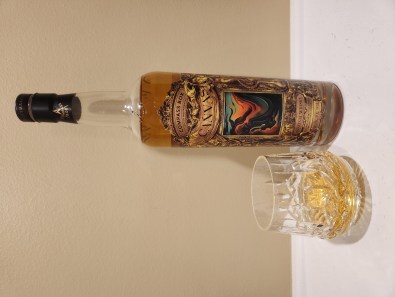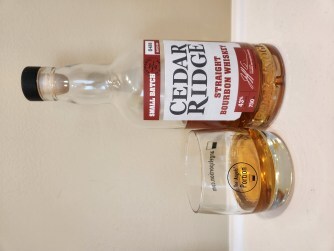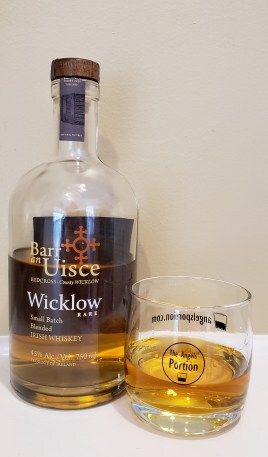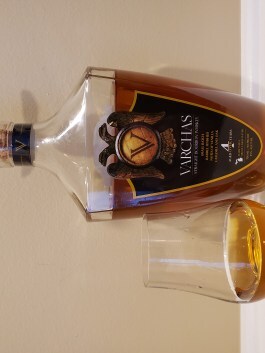Christopher Ian Thoma's Blog, page 4
June 24, 2023
Review – Compass Box, Canvas, (No Age Stated), 46%

It’s good to pray for others, especially for folks you’d prefer to run over with your car. Admittedly, those prayers are harder to fashion. Still, when you just don’t know what to say in such moments, especially at 2:00 in the morning, instead of wandering around inside your head, the Psalms are a great place to start. I have plenty of Psalms memorized. Psalm 27 is one. Psalm 34 is another. I can call these up relatively easily.
There are others I have memorized, too. I call on them from time to time. For example, on many occasions, I feel the urge to pray Psalm 109 for a particularly well-groomed gent and his friends who rev their truck engines at all hours of the day. Indeed, you’ll know these young men’s doings at noon just as you’ll know them at midnight. They’re fine upstanding citizens who never fail to demonstrate genuine concern for young and old. Their language is colorful. Their trucks’ bumper stickers bespeak honorability. Their bantering betrays the same. Truly, these young men are all but assured a place in the human record as some of mankind’s best.
Their parents should be proud.
Firstly, looking back at what I’ve just written, I hope the sarcasm is easily detectable. Secondly, I realize there will be those who read and reply, “Boys will be boys.” Yes, boys will be boys. But for a season. Boys exist on a trajectory. Boys are to become men. If a boy does not become a man—and as such, become the proper demonstration of a respect-worthy man for future generations—from the natural law’s perspective, he is lost. In his lostness, he becomes another kind of metric. All other boys who’ve become men must refer him to their children as a behavioral aberration to mark and avoid. In other words, he is not what a man should be; therefore, he is not what a husband and father should be. Avoid him so you do not become like him, thereby, unfortunately, extending his nature’s days. Instead, “May his days be few…. may his name be blotted out in the second generation” (Psalm 109:8, 13).
In some ways, this truth applies to whisky. Some are boys who will forever be boys, and thusly, should be avoided. Scoresby Scotch is the bottom-shelf, engine-revving example that comes to mind. Scoresby is bottled uselessness. However, at the other end of the spectrum exists the likes of Compass Box, most notably, the thoughtfully named Canvas edition.
A portrait of whisky-making’s grandest hues, Canvas demonstrates maturity. The Canvas foretells its potential with an initial nose of earl gray, lemon citrus, and maybe even a little bit of salt. A few drops of water convert the lemons to grapefruits.
The palate is a creamy swath of oily butter and honey. The citrus from the nose remains. A few sips into the dram, the citrus becomes more berry-like, staying through the lengthier but soothing finish.
While imprecatory petitions like Psalm 109 are equally available at all hours to a troubled soul, especially when burdened by the most annoying among us, another Psalm I mentioned—Psalm 34—is available, too. It’s a calming Psalm of thanksgiving and most appropriate to the Compass Box Canvas edition.
When awakened at 2:00 in the morning by the sounds of revving truck engines, I recommend combining the two. Praying the Psalms while sipping a comforting whisky is a sure way to avoid a more primitive demonstration of manhood that could land you in jail.
The post Review – Compass Box, Canvas, (No Age Stated), 46% appeared first on AngelsPortion.
June 23, 2023
Review – Cedar Ridge, Straight Bourbon Whiskey, Small Batch (#0488), 2-4 Years Old, 43%

George Burns once said something about how you know you’re getting older when you stoop to tie your shoes and, because it’ll take a while, you wonder what else you could do while you’re down there. Although another sign might be that as you’re taunting your teenage daughter from across a room, you stick out your tongue and pull a neck muscle. If you can’t even make playful faces without hurting yourself, it’s time to think more intently about retirement—about how and where you’ll finish your days.
I wouldn’t say I’ve reached “old age” just yet. However, I’ve crossed well into its borderlands of warning. It’s a place of mirrors. It’s a place where life swirls around you, and as it does, you see your younger self. Strangely, he’s constantly bewildered. He’s wondering why when he picks up a heavier object, his back hurts for days. He’s wondering why his body makes so many noises while in motion and how it hurts to sleep in. He’s wondering why he cannot do the things he used to do. He’s wondering how, in hell’s vast expanse, people younger than him—kids still playing video games—are being trusted to build submarines and hold authoritative positions in the United States government.
Aging’s borderlands are a strange and alien place. Things are different here.
Retirement has become a regular topic in casual conversations between me and Jennifer. I suppose that’s another sign. Admittedly, I instigate it when I begin feeling as though I can’t go on—that I can’t continue dealing with the messes that pastoral life brings. Whether or not this radically individualized age considers us villains, pastors continue steering into life’s dirtiest underbelly. We continue facing off with the grossest and most burdensome sins to provide help. And most often, because of confidentiality, we’re the only ones who know any given moment’s truest magnitude.
I’ve become convinced that pastors age like dogs. Because for decades, we’re constantly expelling physical and emotional energy to everyone in need, one pastoral year equals seven regular human years. That’s part of my concern. At such a pace, when a pastor retires, he’s far too spent to rest and enjoy it. He’s given everything he has to everyone else. I imagine it’s the same for police officers and anyone in the counseling profession.
All of these verities now spoken, there’s a better thought within reach. No matter one’s age, with each new year, comes the opportunity to learn. I’m most certainly a learner. Learners set goals. C. S. Lewis lassoed these thoughts into one, noting that we’re never too old to set a new goal. With that, as each year arrives, I follow his advice. I have a goal-filled future before me, no matter how long it may be. For one, my doctorate is right around the corner. After that, I intend to act in a movie. I don’t yet know how, but I will do it. First things first.
One of my smaller ongoing goals has been to continue trying new whiskeys. No matter the origin, no matter the distillery, good or bad drams, I intend to continue trying new whiskeys until I die. The opportunity and process have always brought me joy. Thinking back to George Burns, he was content to smoke cigars and drink whiskey his entire life. He lived to 100. I’m guessing there may be something to it. Either way, my closest friends know this love, and so they fan its enduring flame. For example, my good friend Joe (a fellow pastor in Iowa who knows what I’ve written so far is true) sent me an uplifting edition—the Cedar Ridge Small Batch edition. He called it a favorite, considering it a reasonably priced go-to whiskey in times of need. An Iowa-born whiskey, I wasn’t so sure. What’s that line from Clint Eastwood’s Unforgiven, something like, “I thought I was dead once, but it turned out I was just in Iowa”? Or maybe he said Nebraska. I’m getting older. With age comes the privilege of forgetfulness. Either way, and as it serves this rambling, both states have lots of corn—lots and lots of corn.
The Cedar Ridge emits corn. At 74% corn and 26% rye and barley, what would you expect? With that, its nose is an easily detectable sweetcorn concoction—dry but not unpleasant. A little water stirs up other things the Iowa soil can produce, namely warmed pear juice and mild oak.
The palate continues what the nose began. But given a few moments to learn, it reaches beyond its innate tendencies, adding mild sprinklings of vanilla, almonds, and dried peaches. The finish is simple and short, giving very little more than spiced caramel.
Joe was right. It’s not bad. Indeed, it can be a go-to whiskey at any particular moment along life’s way. Heaven knows there will be plenty of such moments for us pastors—moments when the only thing keeping an exhausted and well-aged preacher from walking out of worship before strangling a few choice parishioners is God’s equally necessary and go-to grace in his own life and the promise of go-to provisions in the clergyman’s whiskey cabinet at home.
The post Review – Cedar Ridge, Straight Bourbon Whiskey, Small Batch (#0488), 2-4 Years Old, 43% appeared first on AngelsPortion.
June 22, 2023
Review – Eimverk, Flóki, Sheep Dung Smoked Reserve, 3 Years Old, 47%

You might be surprised to hear it, but I’m fascinated by rude people. Not in a good way, of course. Like you, my sinful side is usually rooting for a rude person’s demise. It’s just that the animalistic confidence is darkly intriguing. It’s the kind of behavior that, as I watch, I almost expect to hear David Attenborough’s voice narrating its necessity for a particular subspecies of humanity’s crass survival. You know what I mean. A conversation becomes a disagreement. With all their other skills used up, the subspecies human turns to rude name-calling. And why? Because it’s their only means of survival.
Sometimes, it’s little more than the subspecies’ unfortunate instinct.
“The rudeness is purposeful,” the British narrator might describe, his voice at the edge of an elderly rasp. “The customer must assert a sense of dominance over the waitress, and for good reason. Demeaning the server while also working her to death not only maintains the same sense of ascendency among the customer’s observing offspring, but once the waitress expires, the customer will have a warm and nutrition-rich place to lay her eggs, thereby increasing her brood.”
Sarcasm aside, rudeness does have its place. Although, in such circumstances, it’s no longer inappropriate discourteousness but proper defensiveness and proof of loyalty. It becomes an entirely different form of animalistic confidence. In other words, if a waitress spits on your food, making a scene seems somewhat appropriate. If a man pursues another man’s wife, the husband will likely be less-than-cordial to the pursuer. If a man comes for his children, the father’s words and deeds will align in far more offensive ways. Not only might he tell the offender to go to hell, but it’s likely he might send him there.
How do I know this? Well, let’s just leave it at that. In the meantime, there are other moments when the seemingly rude is appropriate. For example, if I were to put anything before you at the dinner table that had been in contact with animal feces, you would count my gesture as offensive. And rightly so. I’d only do that if I wanted you as an enemy. And yet, the Flóki Single Malt smoked with sheep dung would be an extraordinary exception. Pouring and placing this delightful dram before you would be a humble wish for friendship.
By the way, you read that correctly. Rather than using peat to smoke this Icelandic whisky’s barley, sheep excrement is employed. The sheep eat. Their gastrointestinal tracts expel piles of undigested food ridden with undesirable bacteria and cellular debris. These piles dry. They’re gathered, lit on fire, and smoked into moistened barley, the grains taking in the smoke’s unique character.
Are you at all surprised that Icelanders descend from Vikings? I’m not.
Now, being the type of father who instigates more than his fair share of toilet humor in the household, I can think of about fifty things to say about this whisky’s nature, all of which my wife would typically categorize as rude. However, in this instance, it would be sincere commentary, and it would be most appropriate. Indeed, this is some good… um… whisky.
The nose—a buttery sensation barely tinged with smoke but rich with coconut and dried fruit—makes you wonder where the folks at Eimverk got their sheep. The Philippines? Sri Lanka, maybe? And concentrating on the smokey aspect, a series of mysteries emerge, asking, “Whoever came up with this idea, what were they drinking at the time, and exactly how close to the campfire were the sheep?”
The palate is a maple wood charcuterie of the sheep’s barnyard friends. Either that or my mind is too fixed on the distinctive nature of the experience. I sensed cheese, charred beef, and sweet corn. While it’s a fine combination, I don’t want to overthink the corn. I just don’t.
The finish is exceptionally long, leaving peppery embers behind. The butter is there, too, except it’s a bit saltier than before. The sheep were definitely pastured near the sea.
Overall, and as mentioned before, this whisky is good. Now, would I recommend smoking your salmon this way on the grill? No. If you set a dung-smoked meal before me, you’ll receive a ruder, more primitive me. That’s never the kind of farm-to-table experience I’m willing to try. On the other hand, it’s an altogether different adventure to smoke grains later distilled into microbial-murdering alcohols. I’ll put that stuff in my mouth and won’t even feel the urge for a breath mint.
The post Review – Eimverk, Flóki, Sheep Dung Smoked Reserve, 3 Years Old, 47% appeared first on AngelsPortion.
June 21, 2023
Review – The Macallan, Rare Cask, 2021 Release, (No Age Statement), 43%

It’s storming as I write this. Quite ferociously, in fact. And so, here I sit. As I do, I examine, realizing this community is about to be damaged. Accepting this is about all any of us can do.
The thing about storms is that once they come, the only real way to escape is to endure. There is no negotiating with the sky. You can only shelter from it. You cannot divert the wind. You can only barricade against it. You cannot pinpoint the lightning’s strike. You can only expect it and then know it touched something, somewhere, when you hear its thunderous departure.
Storms alter landscapes. They erase human achievement. They churn up disorder and exchange concern for ease. Again, from a human perspective, the safest place in any storm will always be in one’s will to endure. I’d say this is true because determination knows something of life’s storms. It knows their time is limited. It knows that the sun is still shining at the borderland of any storm’s darkness, and at some point, its beams will reach through. They always do. Until then, understand the storm’s value. Observe it. Respect it. Lean in. Hold on. Learn from it. Epicurus is the one who said something about how the truest pilots are known only by the storms.
I’ve long wondered why I enjoy whisky enough to write about it. It must be something more than taste. I think it’s because endurance will always be a factor in its creation. Preparations are made. The labor ensues. The elixir is born. Into the barrel, it goes. There it endures, just as its creator must endure, hoping that on the far side of the years-long journey, whatever challenges come, they will play a part in creating a pilot—something that others will be drawn to follow.
Within the last few years, I’ve heard others say The Macallan has lost its enduring footing and is no longer a captain among drams. And yet, in the middle of the feverish gales, the 2021 Rare Cask edition can be seen. An honest handling—one unwilling to write what everyone else has written, one uninfluenced by the popular noise—this whisky leans into the pelting, once again proving the mettle few other distilleries can claim.
The 2021 Rare Cask’s scent is crisp, delivering dark cherries and cloves. Don’t add ice. It has endured ice but isn’t meant for it. Instead, add a little water. It’ll stir up spiced apricots.
Continuing along, the palate offers a nip of yeasty sour. But endure, my friend. Give it a moment. Be honest, concentrating on the change. It becomes a freshly baked cinnamon roll soaked in dark roast coffee. Keep with it. Be determined. The medium finish is just as delightful, conjuring sherried vanillas and oven-singed brown sugar.
Indeed, distilleries go through seasons. Those seasons bring storms. Still, The Macallan stands as the luxury tonic among tonics for good reasons. It remains a pilot among pilots. Take a hint from the 2021 Rare Cask edition’s rust-colored frame. The Macallan continues enduring each tempest, emerging from the waves with unmatchable drams, even as so many others only wish they could and yet, have been overcome.
The post Review – The Macallan, Rare Cask, 2021 Release, (No Age Statement), 43% appeared first on AngelsPortion.
June 20, 2023
Review – Aberlour, A’bunadh, Batch 64, Cask Strength, No Age Stated, 59.9%

Imagine for a moment that you’re at a funeral. Suddenly, a scratching sound becomes a somewhat shallow thumping from inside the coffin. What do you do? Do you open it?
Now, hold on a second. You should think this one through because plenty could go wrong. For one, if you open it and out jumps the first zombie-virus-spreading beastie, long after you’ve been eaten, you’ll be remembered as the idiot doorman for the world’s destruction.
“So, which idiot opened the casket?” a group member will ask while leaning against a barricaded door.
“It was Steve,” someone will sigh.
“Did it get him?” another will ask.
“Yes.”
“Good,” others in the group will simultaneously whisper.
Another possible outcome might be that the person inside was pronounced dead by mistake. In that case, when the formerly deceased emerges from the casket, having realized those in attendance were genuinely incompetent health advocates, I suspect a few estate changes and maybe even a few lawsuits. It might be better for the funeral attendees to crank up the sad songs and cry a little louder.
Humor aside, having read an article about this happening recently in Ecuador, I shopped the scenario to an AI chatbot. I asked the not-far-from-Skynet device what should be done if this happened. Its advice proved its programmers’ ridiculously inhuman middles. It gave five different long-winded answers, all keeping the person in the casket waiting. Apparently, there are legal things to consider. Also, the folks outside the coffin must be emotionally prepared for whatever might happen next. It would be good to fetch a certified counselor for a preparatory session.
How about this instead? Let the terrified person out of the casket. Who cares if the funeral director is the only licensed guy to do it? Who cares if the mourners are emotionally prepared or not? Trust me. They’ll all get over it. The only one who won’t is the person who has less than an hour’s worth of oxygen left in the cramped blackness.
If this were ever to happen to me, I can assure you that whoever lets me out will inherit my earthly treasures at the hour of my actual death. I don’t have much. However, I have a lovely whisky collection. I used to want to be embalmed and buried with its editions, but in this circumstance, I’d pass it along to the one who cared. I’d almost certainly ensure the collection had a nice full bottle of the Aberlour A’bunadh, particularly Batch 64.
A cask-strength delight bottled at 59.9% ABV, this edition is certainly appropriate for the embalming process. But it’s so much better utilized through the lips than the veins. And as I said, it would most certainly be a part of my rescuer’s inheritance.
Pour some. You’ll see—a swirl and sniff lift sherry, some sherry, and then a little more sherry. Add a little water, and suddenly, cinnamon begins twirling at the sherry’s edges, promising a spicey interface. The palate delivers on the promise. However, its fulfillment isn’t cinnamon but peppery brown sugar—a uniquely wonderful nip that steers its enjoyer right back into the sherry.
The whisky’s crisply dry finish—consolidating everything experienced so far—begs your return to the store for another bottle. You realize this limited-release one won’t last while you’re alive, and if you’re going to have a worthwhile thank-you for that singular person who cared, you’ll need to have another one on deck.
By the way, it might be a good idea to make sure this bottle is on hand and ready at the funeral scenario previously described. If I’m alive, I’ll likely want to participate in its joy with my rescuer. On the other hand, if I’ve become some undead creature, I’ll be counting on that rescuer to turn his courage toward everyone else in the room’s concern. At 59.9%, the A’bunadh Batch 64’s flammability could be a helpful asset.
The post Review – Aberlour, A’bunadh, Batch 64, Cask Strength, No Age Stated, 59.9% appeared first on AngelsPortion.
June 19, 2023
Review – Lagavulin, 12 Years Old, Cask Strength, 2015 Edition, 56.8%

Even though the restrooms are right over there, rather than pause your conversation and carry your three-year-old to visit them, I say go ahead and aim the toddler into the juniper bushes beside you. Don’t mind any of the folks dining at the adjacent café tables. There’s absolutely no chance the day’s sturdier breeze will carry the spattering mist toward them.
And one more thing. You might want to let the child lie on the ground where he just did his business. Yes, the sugar ants are plenty. However, I’m guessing you’ll be able to continue chatting with the other adults relatively uninhibited while the child remains distracted, fondling his boy parts, french fries, and the newly wetted juniper branches.
If I were ever invited to discuss the topic of common sense with philosophers, the first argument I’d bring to the conversation is that the term itself is a misnomer. Common sense—or as the Oxford Dictionary defines it, “good sense and sound judgment in practical matters”—isn’t an instinctual human characteristic. Society continues to prove that it must be taught. If not, the truer human instincts of bad sense and unsound judgment will become the catechists. A child urinating in the bushes at a public café will likely teach his children to do the same, all good sense and sound judgment in such practical matters being foreign to his upbringing.
On the other hand, if a child begins demonstrating common sense apart from what he’s learned, I’d argue he bears the mark of original genius. Keep your eyes on him. If he starts a company, invest in it early. He’s likely to be another Elon Musk, having proven his innately exceptional thinking in the simplest circumstances.
Relative to whisky, certain distilleries communicate original genius in similar ways. Lagavulin is one of those distilleries. In particular, the 2015 edition of their annual 12-year-old Cask Strength series hints at extraordinary talents in practical whisky-making matters. In other words, choices were made that no one else had considered or taught.
Wafting a charred and salty ribeye dressed in fruit salsa composed mainly of mangos and tangerines, the 2015 edition teases its unlearned uniqueness. A sip of peppery malt and mildly sweet raspberries certifies it. Its finish—an ashen lick of most everything described already—begs for a seat at the philosophers’ table. It wants to be examined. It wants to be asked if it learned these exceptional qualities or just knew them.
While plenty of other distilleries continue to be little more than urine in the juniper bushes, Lagavulin regularly beckons one’s investment with so many of its drams. The 2015 12-year-old Cask Strength edition is certainly one. In fact, I can even say that if it were being carelessly poured by a senseless adult on a windy day, I would not mind being caught in its sticky drizzle.
The post Review – Lagavulin, 12 Years Old, Cask Strength, 2015 Edition, 56.8% appeared first on AngelsPortion.
September 16, 2022
Review – Benriach, The Original Ten, 10 Years Old, 43%

“I really need someone to travel along with me everywhere I go,” I said, walking into the kitchen and setting the grocery bags on the counter.
“Why?” Jennifer asked, giving a glance from the stove where she labored to prepare stuffed pepper soup.
“Because,” I replied, beginning to pull items from the bags, “I truly need a witness to what I’m forced to endure out there.”
“What happened?”
“And I need someone to protect me from myself in certain situations at certain times of the day,” I added, pulling more items from the bags.
“Chris, what happened?”
I proceeded to describe what was a hurried trip to the local grocer for a few boxes of macaroni and cheese, chicken noodle soup, and a gallon of laundry detergent.
I wear my clerical collar everywhere I go. It’s the uniform of my office as a pastor. I know, I know. There are plenty who’d debate its modern utility. Interestingly, that’s relevant to the story. Nevertheless, because it’s what I wear, and because I rarely get a day when I’m not on deck for something relative to my vocation, there’s really no use in me wearing anything else. You can pick me out of a crowd at Home Depot, as I’ll likely be dressed in my clerical. If you pass by me in Walmart, the same. If I’m up in a tree cutting branches, the same.
As it would go, I walked through the mechanized doors of our town’s little market to the immediate attention of a young man. A lavender polo shirt adorned his almost-portly frame tucked into brown high-water skinny jeans just above his argyle socks and soft-soled oxford shoes. His hair, fading up from a shave on both sides, was combed up and forward in a perfectly arranged pompadour. Every beard hair was accounted for and in place. And by the way, by “attention,” I don’t mean that he glanced at me and then returned to whatever was previously occupying him. I mean that his attention followed me like a surface-to-air missile tracer. Where I went, so did his glaring interest.
Firstly, I was in a hurry. Jennifer was at home fixing a dinner that was nearly ready. And not only that, but having already endured a long and exhausting day, and proving how such days can dismantle one’s guarding of the sinful nature, I thought to myself while returning a showdown stare, You must be the hip new youth pastor at the local non-denom church.
Secondly, while this man’s attention was anything but casual, you must know that momentary glances are not foreign to my life. Men wearing clerical collars in public is side-show freakish in America today. People give looks. And because this is true, few clergy seem interested in donning the uniform. Most appear to want to blend in with the world around them. Mostly, I think that’s a bad idea, and I have good reasons for believing so. Still, that’s a discussion for another day.
As I made my way from aisle to aisle, I noticed the young man on occasion—his attention less targeted but his pursuit deliberate. In one aisle, I tried to dodge him. Specifically, he was at one end of an aisle, and I was at the other. When I left the aisle in one direction, he left nonchalantly in that same direction at the other end. However, shielded by the end cap, I immediately turned and went in the opposite direction. But lest you think I tricked this well-groomed late-twenties gent, I’m assuming he, too, did a U-turn because, within moments, he’d discovered me two aisles away from where he’d lost me.
He pursued me in this way for five or six minutes. That’s a long time. And friends, it isn’t something normal human beings do. I was starting to become concerned that he somehow recognized me, perhaps having heard one of my metro-Detroit radio segments or that he’d attended a speech I’d given. I worried he would confront me, giving me a piece of his mind.
It wasn’t until I came in for a landing at the self-checkout that he finally spoke, somewhat startling me from behind, “What parish are you from?”
“I’m a Lutheran pastor,” I said, already scanning my mac-n-cheese boxes. “I serve a congregation church in Hartland.”
“That’s great, man,” he said. “I’m the new youth pastor at a church up in Flint.”
“I know,” I said, the relief from not being verbally accosted settling over me while at the same time my damnable sin-nature betraying my initial thoughts.
“Oh, how’d you know?” he asked, revealing his surprise. “Have you been to our church?”
“No,” I said, hurriedly scanning the last of my items before I could say anything offensive. “I just kinda figured.”
“Well, our church did a press release when they hired me,” he said. “Maybe you saw that?”
“No,” I replied, grabbed my bags, and backstepped toward the doors. “I don’t think so. Like I said, I sorta had a feeling.”
“Well—”
“—I’m really sorry,” I interrupted. “I’m in a huge hurry, and I really need to get home.”
“Yeah, no problem, dude.”
“It was a pleasure meeting you. I hope we run into each other again and have a little more time to chat.”
“Um, yeah, okay. I’ll see you around.”
“Blessings to you in your new position,” I said and was out the door.
When I returned home, I immediately knew the whisky that would calm my irritation because it matched the occasion: the Original Ten edition from Benriach. This three-casked ten-year-old offering from Benriach, when I first opened and nosed the bottle, gave a strange stare. On the one hand, there was the sense that I already knew what to expect from the Benriach distillery. And yet, the more I inhaled, the more I sensed an unfamiliar sour that I thought could take the relationship south in a hurry. Thankfully, it didn’t, and after a few moments, it became a wafting of pleasant familiarity.
Apart from citrus-zest glances, the nose of the Original Ten bears a subtle peatiness in its driftings. This ashen specter pursues the whisky throughout the experience. It’s not necessarily bad, but it does seem a little out of place.
The peat, while looming nonchalantly on the palate, provides a peppery edge to the other items in the imbiber’s basket—graham crackers, vanilla, and lime zest.
The finish is barely into medium range, carrying along in its expedited adventure the ever-pursuing peat and the items in the palate’s basket. Again, I know, I know. I was swiftly unfriendly to the young church worker in the grocery store, even though I was wrong about the interaction’s anticipated outcome. Still, I was eerily correct in my ratchety assumption, suggesting at least a sliver of accuracy to the stereotype. With that, and in my exhausted state, no matter how it eventually unfolded, I was destined to make things worse if I’d continued the conversation. And so it was best to follow the Lord’s instructions: to avoid being rash, let one’s words be few (Ecclesiastes 5:2).
The post Review – Benriach, The Original Ten, 10 Years Old, 43% appeared first on AngelsPortion.
September 13, 2022
Review – Barr an Uisce, Wicklow Rare, Small Batch Blended Irish Whiskey, (No Age Stated), 43%

Have you ever been so angry that you felt the urge to… well… do something you probably shouldn’t? If so, let me give you a little bit of advice.
Disregard attempting to calm yourself by controlling your breathing or counting to ten. Doing these contemplative things will only add to the premeditation aspect of the prosecution’s case when you’re eventually put on trial for doing what you intend to do. They’ll say you thought it through. Instead, let it be an unhindered crime of crazed passion. This will put you closer to an insanity plea, and with that, no chance at the electric chair and the probability of a prison release date minus a few years.
Yes, I just advised you to think through not thinking things through. It’s paradoxical, I know. But many things in life are paradoxical. Regarding engagement in the world around me, I live by the principle that to risk nothing is to risk everything. That’s a paradoxical statement, which, by the way, is different than an oxymoron. As a rhetorical device, a paradox usually appears contradictory but is really something used to make the reader dig deeper to find something that actually does make sense—something that’s worth remembering. An oxymoron involves broken logic. An original copy cannot be a prototype. An only choice does not present opportunities for decision-making. An exact estimate is still nothing more than a best guess.
Some whiskies are paradoxes. Others are oxymorons. Scoresby Scotch is an oxymoron. It calls itself Scotch, but certain production rules must be followed to be labeled as such. Mixing tarry black substances squeezed from the devil’s veins into finishing barrels is not one. On the other hand, the Wicklow Rare from Barr an Uisce is a paradox. It appears to understand that less is more.
Familiar to the nose, palate, and finish is the sense of warmed fruit. Some imbibers might want more from each of these three components, and I suppose if they try really hard, they’ll discover hints of other morsels here and there. A sense of honied almonds is one that the palate might reveal. But overall, the nose begins with stove-steamed fruits. The palate takes them from the stove to the oven. The finish is a medium-length savor of the fruits’ crisper edges. In short, warmed fruits are the primary investment in this dram. And this is a good thing. The richness is undistracted and consistent, resulting in a surprising fullness rare to most other Irish whiskies.
With the Wicklow Rare, indeed, less is more. Although, this paradox comes undone when you realize that less is not more in relation to quantity. Less of this delightful concoction is not a bounty but poverty—or as Mark Twain so famously noted, “Too much of anything is bad, but too much good whiskey is barely enough.”
The post Review – Barr an Uisce, Wicklow Rare, Small Batch Blended Irish Whiskey, (No Age Stated), 43% appeared first on AngelsPortion.
Barr an Uisce, Wicklow Rare, Small Batch Blended Irish Whiskey, (No Age Stated), 43%

Have you ever been so angry that you felt the urge to… well… do something you probably shouldn’t? If so, let me give you a little bit of advice.
Disregard attempting to calm yourself by controlling your breathing or counting to ten. Doing these contemplative things will only add to the premeditation aspect of the prosecution’s case when you’re eventually put on trial for doing what you intend to do. They’ll say you thought it through. Instead, let it be an unhindered crime of crazed passion. This will put you closer to an insanity plea, and with that, no chance at the electric chair and the probability of a prison release date minus a few years.
Yes, I just advised you to think through not thinking things through. It’s paradoxical, I know. But many things in life are paradoxical. Regarding engagement in the world around me, I live by the principle that to risk nothing is to risk everything. That’s a paradoxical statement, which, by the way, is different than an oxymoron. As a rhetorical device, a paradox usually appears contradictory but is really something used to make the reader dig deeper to find something that actually does make sense—something that’s worth remembering. An oxymoron involves broken logic. An original copy cannot be a prototype. An only choice does not present opportunities for decision-making. An exact estimate is still nothing more than a best guess.
Some whiskies are paradoxes. Others are oxymorons. Scoresby Scotch is an oxymoron. It calls itself Scotch, but certain production rules must be followed to be labeled as such. Mixing tarry black substances squeezed from the devil’s veins into finishing barrels is not one. On the other hand, the Wicklow Rare from Barr an Uisce is a paradox. It appears to understand that less is more.
Familiar to the nose, palate, and finish is the sense of warmed fruit. Some imbibers might want more from each of these three components, and I suppose if they try really hard, they’ll discover hints of other morsels here and there. A sense of honied almonds is one that the palate might reveal. But overall, the nose begins with stove-steamed fruits. The palate takes them from the stove to the oven. The finish is a medium-length savor of the fruits’ crisper edges. In short, warmed fruits are the primary investment in this dram. And this is a good thing. The richness is undistracted and consistent, resulting in a surprising fullness rare to most other Irish whiskies.
With the Wicklow Rare, indeed, less is more. Although, this paradox comes undone when you realize that less is not more in relation to quantity. Less of this delightful concoction is not a bounty but poverty—or as Mark Twain so famously noted, “Too much of anything is bad, but too much good whiskey is barely enough.”
The post Barr an Uisce, Wicklow Rare, Small Batch Blended Irish Whiskey, (No Age Stated), 43% appeared first on AngelsPortion.
August 26, 2022
Review – Shankar Distillers, Varchas, Straight Bourbon Whiskey, Small Batch, 4 Years Old, 45%

The more I learn about birds, the less I mind seeing them die by flying into windowpanes or ricocheting from windmill blades. They truly are vicious creatures.
I’ve arrived at this conclusion because my wife, Jennifer, has become somewhat of a proficient nature photographer. As such, she has learned quite a lot about birds. I’ve become accustomed to her breaking a conversation mid-sentence by shouting out the name of a bird she’s just spotted. It usually goes something like…
“So, I was talking with Wendy about the four of us getting together for din—red-tailed hawk!”
Hurrying to her camera, she’ll add, “You know, these birds are known for…” and then relay something horrific about their behavior. And it’s not just the birds of prey. They’re actually somewhat intriguing. It’s more the usual suspects, the birds everyone sees every day.
The plentiful house sparrows flittering around most neighborhoods are an example. They murder other birds just for fun. That’s right. It’s not an issue of territory or food. They just kill other birds. In fact, I learned they’re so rotten that it’s legal to kill them in most states. For the record, the Thoma family doesn’t refer to them as sparrows anymore. We call them murder birds.
By the way, it’s likely not coincidental that a flock of crows is called a “murder.”
One day we experienced the joy of robins hatching in a nest under our deck. While they are probably the ugliest newborn creatures I’ve ever seen, it was quite the ethereal moment. However, within minutes of their birth, a blue jay flew to the nest and pecked them to pieces, eating pretty much most of them. A crow came and cleaned up the mess that fell to the ground below.
Are you familiar with cowbirds? If not, the only thing you really need to know about them is that they’re the deadbeat parents of the bird community. They lay their eggs in other birds’ nests, leaving the care to others. If I remember correctly, they use their freedom on weed-smoking gambling binges at the local casino after doing this. Unfortunately for their offspring, and because the bird sphere is a darkly place, if the foster parents figure it out, they destroy the eggs, usually by knocking them from the nest. Other birds come to make sure the deed is done.
Redwing blackbirds spend their whole day shouting at everyone. They remind me of the handful of homeless people I experienced in Los Angeles. Cardinals are bullies. Mockingbirds are the escaped psychopaths of the bird world. They attack everything—other birds, animals, people. If a mockingbird doesn’t like a rock, it’ll try to kill it.
I could continue describing the vile nature of countless species of birds most folks would consider beautiful or majestic. But in the end, they all have one thing in common: evil. I’m willing to submit that perhaps their ability to sail upon the breezes has less to do with the science of flight and more to do with being carried in the leathery palms of unseen devilish specters hovering in the in-between.
Birds are cruel. Birds are vicious. What’s more, I think it’s safe to say they actually do crap on our newly washed cars on purpose. That’s something a demonic beastie would do. It would wait for just the right moment to steal someone’s joy. Perhaps that’s why the Michigan-made Varchas Straight Bourbon from Shankar Distillers has a bird perched atop its cap, ready to strike. Not so much a nod to the bird’s intent as it is an acknowledgment of what the whiskey inside will bring: joy.
With a nose of freshly plucked honeycomb and spice, it promises a crisp enjoyment that the darker entities in this world don’t want for us. A sip confirms this, bringing an undertow of warm molasses mingled with espresso along its easy current sourced by the Great Lakes. There may even be a chocolate chip or two in there, too. The finish is a medium jaunt of allspice and burnt pepper.
These are all wonderful things making for a pleasurable dram, things a vile flock of murder birds would love to snatch away from us. For that, it’s good that humans exist within buildings—and that they keep their better whiskey editions indoors, too. Although, keep an eye on your parakeets and cockatoos. I can assure you their bloodlines are innately tarnished by bad manners born from evil intentions, and they’re not to be trusted.
The post Review – Shankar Distillers, Varchas, Straight Bourbon Whiskey, Small Batch, 4 Years Old, 45% appeared first on AngelsPortion.



